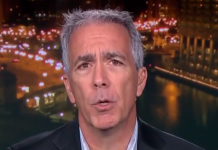Christian author and marriage counselor Tina Konkin relies on a familiar theme in her new book: When the husband cheats, blame the wife. That’s exactly what her book encourages women to do if their husbands have affairs — blame themselves.
In her book “How God Used The Other Woman: Saving Your Marriage After Infidelity” Konkin tells her readers she stopped blaming her husband for having sex with another woman and instead asked herself what she could have done to make him happier, Patheos reports.
“It was time for me to look at all the negative stuff I’d dragged into my marriage,” Konkin writes. “I had to admit though that the question God was asking me was so difficult that I had to brace myself for what I would see. The thought that I had, in any way, participated in the affair or the degradation of my own marriage was like an emotional foreign invader.”
I’m not against looking inwardly when problems arise. However, a husband is 50 percent of the marriage and 100 percent responsible if he has an affair. This kind of thinking infantilizes grown men and suggests they aren’t responsible for their own actions.
So Konkin is helping to perpetuate the idea of holding women responsible when men do things they shouldn’t do. We already have an infantile president who continues to do this whenever women come forward to report the terrible things he’s done. Then there’s the conservative Christian writer who defended Brett Kavanaugh in an op-ed by pinning the blame on his alleged victim, Dr. Christine Blasey Ford, DeadState reports.
“Women know instinctively how to protect their honor: screaming, shouting, slapping, spitting, slugging, and stabbing with a finger, pencil, or hat pin,” writes Dr. Don Boys. “Since she did not cry out or stab him, I will not believe her without a film of the event.”
And in her article for Patheos, writer Sarahbeth Caplin notes:
“This is [sic] marital equivalent of asking a sexual assault victim ‘What were you wearing?’ The only people who deserve blame are the ones who committed the act.”
What’s worse is Konkin isn’t merely suggesting a wife is responsible for a husband’s infidelity. No. It’s the entire premise of her book, Raw Story notes. She claims that at one point God asked her “What role did you play in this?” as she sought guidance.
Konkin admits it was difficult to blame herself for her husband’s actions, but as she prayed she resolved that “the way out of this mess wouldn’t include blaming my husband or friend.” But perhaps instead of blaming anyone, we should promote a healthy ideal that empowers people to be responsible for what they do.
I don’t know. It’s just a thought.
And fortunately, not all Christian writers beat the “blame the wife drum.”
Sheila Wray Gregoire, who writes for To Love, Honor, and Vacuum notes:
“If a man abuses his wife, we know not to say ‘What did she do to provoke him?’ But when a man cheats on his wife, we still ask, ‘What did she do to contribute to it?'”
And she shared her thoughts on Konkin’s book.
“The way Focus on the Family framed this book, the first response was to ask ‘What role did I play?’ A marriage can only start healing if the cheating spouse repents. That’s always the first step. Once that’s done, the hurting spouse can choose to extend grace, can go to counseling and look at how drift was caused, and try to rebuild. But unless there is total repentance from the cheater, you won’t get anywhere.”
If a husband owns up to what he did, the couple can go from there and perhaps it opens the door for healing to begin. That seems like a healthier approach than what Konkin suggests.
Featured image by Ulrike Mai, license Pixabay via Pixabay











